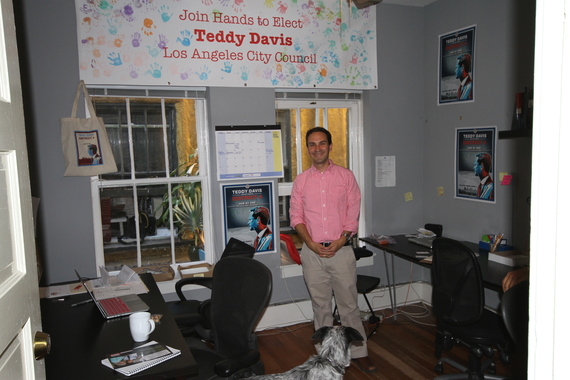"To be a council member, it's like being mayor of someone's neighborhood," Teddy Davis explains to me. Each council member represents 250,000 people, though perhaps less than ten percent will vote in a race for who gets to decide what happens to the land in their neighborhood. Davis is running for City Council for the 4th District, which spans a wide swath of Hollywood to Sherman Oaks, because as a native to the area he sees how he can apply the insight acquired working in L.A. City Hall and in D.C. covering politics for ABC. "I love how immediate and impactful it can be, right where people live."
At a time when development in Hollywood is rampant while infrastructure crumbles, having a voice in what happens to your community in Los Angeles can seem impossible. Having just released a documentary on an Ohio candidate that refused PAC money and party funds, I was struck to learn about a clean-money candidate in my own district. Davis explains, "I don't support the Manhattan-ization of Hollywood," and has such turned down money from real estate developers, even returning six thousand dollars in contributions. He also takes this stand with campaign cash from LADWP, which has refused to account for over $40 million of the city's money spent.
Running a campaign is a lengthy process with constant costs, no matter the office. At a time when most Americans agree overwhelmingly that money has too much influence in politics, it can deter citizens from stepping up to serve their community, and allow vanity candidates to dilute the discourse and lose broader interest in elections. Davis is just one candidate in L.A. who is taking advantage of the matching funds system aimed at reducing big money's role in our government.
In the 1990s, Los Angeles ushered in a 2 to 1 matching funds system for candidates running for Mayor, City Attorney, Controller, or one of the 15 seats on L.A. City Council. This matching meant that if a citizen in the district contributed twenty bucks, the public funds system would then contribute double that amount, an additional forty, so that the candidate then has sixty bucks to spend on their campaign. In the coming year, the City Ethics Commission is expected to raise that amount to 6 to 1 matching. This form of public-backed campaign finance recognizes that corruption begins around the need for money, and that the public interest is served when candidates are focused on the public's interests, not the wealthiest few that can bankroll a campaign like a business investment.
Davis continues, "What you want really in a democracy is for everyone's voice to matter just as much as the next person's. And right now what we have is the ability for some people to give big sums of money, and they end up with an outsized influence on our system. And that's not what it's supposed to be. It's really supposed to be about everyone who wants to participate having an equal chance to influence their government."

